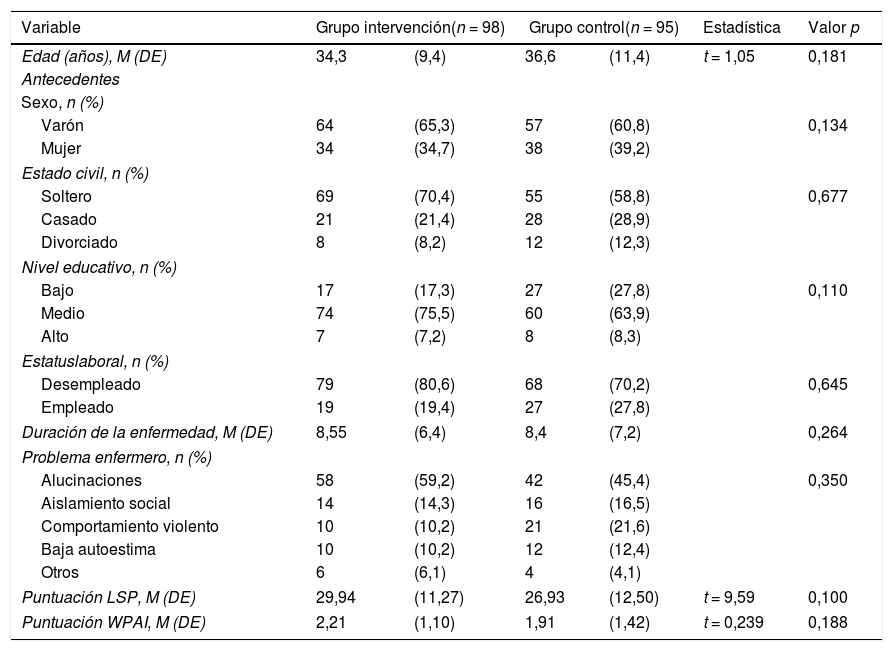El presente estudio tuvo como objetivo evaluar la aplicación del modelo comunitario de enfermería de salud mental (CMHN) utilizando una intervención de atención estándar de enfermería y terapia cognitiva conductual en habilidades para la vida y productividad laboral para la población adulta con esquizofrenia.
MétodoEstudio experimental con un grupo de control equivalente que utilizó 193 participantes asignados al azar al grupo de intervención o control en el centro de salud comunitario en Cipayung, Yakarta. La intervención consistía en una terapia cognitiva conductual de cuatro meses que fue implementada por 33 enfermeros psiquiátricos comunitarios para mejorar las habilidades para la vida y la productividad laboral de las personas con esquizofrenia. Los instrumentos utilizados para evaluar la intervención fueron la versión indonesia del cuestionario de perfil de habilidades para la vida (LSP) y la escala de productividad laboral y deterioro de la actividad (WPAI). El análisis de datos utilizó una prueba t pareada.
ResultadosLos resultados muestran que hubo una diferencia significativa en las puntuaciones en el LSP antes y después de la implementación en el grupo de intervención (19,94 ± 1,27 y 38,83 ± 9,32) con p < 0,001 en comparación con el grupo control (26,93 ± 12,50 y 30,8 ± 12,41) con p = 0,002. Los resultados también muestran que hubo una diferencia significativa de WPAI antes y después de la implementación para el grupo de intervención (2,21 ± 1,12 y 3,82 ± 1,28) con p < 0,05 y en el grupo control (1,91 ± 1,42 y 2,19 ± 1,58) con p = 0,188.
ConclusionesLos modelos CMHN que utilizan intervenciones básicas de enfermería en salud mental comunitaria pueden utilizarse para mejorar las habilidades para la vida y la productividad laboral de las personas con esquizofrenia en Indonesia. La mejora de las habilidades para la vida y la productividad laboral podría fortalecer la capacidad de vivir en la comunidad en este tipo de pacientes.
This study aimed to evaluate the application of community mental health nursing (CMHN) model using an intervention of nursing standard care and cognitive behavioral therapy on life skills and work productivity for the adult population with schizophrenia.
MethodThis study was an experimental study with an equivalent control group using randomly allocated 193 participants to either the intervention or control group at community health center in Cipayung, Jakarta. The intervention comprised in a 4-month cognitive behavioral therapy that was implemented by 33 community psychiatric nurse staff to improve the life skills and work productivity of people with schizophrenia. The instruments used to evaluate the intervention were the Indonesian version of the life skill profile (LSP) questionnaire and the work productivity and activity impairment scale (WPAI). The data analysis used a paired t-test.
ResultsThe findings show that there was a significant difference in scores on the LSP before and after the implementation in the intervention group (19.94 ± 1.27 and 38.83 ± 9.32) with p < .001 and the control group (26.93 ± 12.50 and 30.89 ± 12.41) with p = .002. The findings also show that there was a significant difference of WPAI before and after the implementation for the intervention group (2.21 ± 1.12 and 3.82 ± 1.28) with p < .05 compared with the control group (1.91 ± 1.42 and 2.19 ± 1.58) with p = .188.
ConclusionsCMHN models using basic community mental health nursing interventions can be used to improve life skills and work productivity of people with schizophrenia so this could be a skill to strengthen the ability to live in the community in this type of patients.











